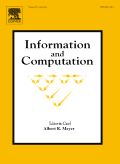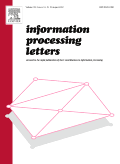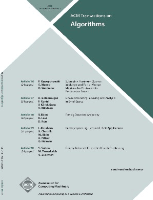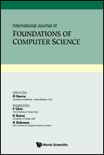
Theoretical Computer Science
Scope & Guideline
Unraveling the Mysteries of Theoretical Computer Science
Introduction
Aims and Scopes
- Computational Complexity:
Research focused on the classification of computational problems based on their inherent difficulty, including studies on NP-completeness, approximation algorithms, and complexity hierarchies. - Algorithm Design and Analysis:
Development of new algorithms and analysis techniques, particularly for optimization problems, data structures, and graph algorithms, often addressing efficiency and performance guarantees. - Formal Methods and Verification:
Exploration of formal techniques for verifying the correctness of algorithms and systems, including model checking, type systems, and proof systems. - Graph Theory and Combinatorics:
Investigation of properties and algorithms related to graphs and combinatorial structures, addressing problems in network design, coloring, and connectivity. - Cryptography and Security:
Study of cryptographic algorithms, protocols, and their security properties, with a focus on theoretical foundations and practical implementations. - Machine Learning and Data Science:
Theoretical explorations of algorithms related to machine learning, including their efficiency, robustness, and implications for data analysis. - Distributed Computing and Networking:
Research on algorithms and protocols for distributed systems, focusing on connectivity, fault tolerance, and performance in networked environments.
Trending and Emerging
- Quantum Computing:
An increasing number of papers focus on quantum algorithms and their applications, reflecting the growing interest in quantum computing as a transformative technology. - Machine Learning Theory:
Research is increasingly exploring the theoretical foundations of machine learning, including algorithmic fairness, model robustness, and the implications of learning in large-scale systems. - Network Algorithms and Game Theory:
There is a rising trend in the study of algorithms in the context of game theory, particularly in relation to social networks and strategic interactions among agents. - Data Privacy and Security:
Emerging research on privacy-preserving algorithms, especially in the context of machine learning and data sharing, is gaining significant attention, addressing the growing concerns around data security. - Complexity of Distributed Systems:
There is a notable increase in studies addressing the complexities of distributed computing, particularly in the context of fault tolerance and resource management.
Declining or Waning
- Classical Automata Theory:
Research in traditional automata theory has seen a reduction in focus, possibly due to the increasing application of more complex models that better represent practical computing scenarios. - Basic Graph Algorithms:
While foundational graph algorithms remain important, there is a noticeable decline in the publication of papers focused solely on classical algorithms, as newer, more sophisticated approaches are being emphasized. - Static Data Structures:
Research specifically targeting static data structures is waning, as the trend shifts towards dynamic and adaptive structures that cater to real-time processing needs. - Traditional Complexity Classes:
There appears to be a reduced emphasis on classical complexity classes, with a growing interest in more nuanced discussions around parameterized complexity and approximation schemes.
Similar Journals

Theory of Computing
Advancing the Frontiers of Computational ThoughtTheory of Computing, published by the University of Chicago, Department of Computer Science, is a prestigious journal that has established itself as a leading platform in the fields of Computational Theory and Theoretical Computer Science. With its ISSN 1557-2862, the journal has earned a reputation for high-quality, peer-reviewed research, positioning itself in the Q1 quartile for both Computational Theory and Mathematics, as well as Theoretical Computer Science as of 2023. Despite its limited open access options, the journal remains a vital resource for researchers and academics, providing insights that push the boundaries of theoretical frameworks and methodologies in computer science. The journal's commitment to rigorous scholarship serves to foster innovation and deepen understanding in a rapidly evolving field, making it an essential reference for professionals, students, and practitioners alike.

ALGORITHMICA
Elevating Algorithmic Insights for Tomorrow's ChallengesALGORITHMICA is a premier academic journal published by SPRINGER, dedicated to the field of algorithms and their applications across various domains. With an ISSN of 0178-4617 and an E-ISSN of 1432-0541, this journal serves as a vital resource for researchers and practitioners interested in the theoretical and practical aspects of algorithmic design and analysis. Recognized for its high impact, ALGORITHMICA is listed in the top quartile (Q1) for Applied Mathematics and Computer Science (miscellaneous) and is positioned in Q2 for Computer Science Applications in the 2023 category rankings. The journal has continuously contributed to advancing knowledge from its inception in 1986 to its ongoing publications through 2024. With a commitment to rigorous peer review and high-quality research, ALGORITHMICA is essential for anyone serious about pushing the boundaries of algorithmic study and application.

INFORMATION AND COMPUTATION
Pioneering Research in Computational Theory and MathematicsINFORMATION AND COMPUTATION is a peer-reviewed academic journal published by Academic Press Inc., Elsevier Science, dedicated to advancing the fields of computational theory and mathematics, computer science applications, and information systems. With an ISSN of 0890-5401 and an E-ISSN of 1090-2651, the journal provides a platform for innovative research that spans theoretical and applied perspectives. Acknowledged for its impact in the community, it holds a Q2 quartile ranking in several categories, including Computational Theory and Mathematics and Computer Science Applications, as of 2023. These rankings place it among the leading journals in its field, making it an essential resource for researchers, professionals, and students aiming to stay abreast of cutting-edge developments. While it does not currently offer Open Access options, the journal intends to foster scholarly communication and knowledge sharing from its inception in 1987 to its future issues expected through 2024. Located in the United States, at 525 B ST, STE 1900, SAN DIEGO, CA 92101-4495, INFORMATION AND COMPUTATION is committed to publishing high-quality research that influences the theoretical foundations and practical applications of its diverse disciplines.

Bulletin of the European Association for Theoretical Computer Science
Connecting Scholars in the Realm of Theoretical Computer ScienceBulletin of the European Association for Theoretical Computer Science is a distinguished journal dedicated to the field of theoretical computer science, published by the European Association for Theoretical Computer Science. With its focus on theoretical underpinnings, algorithmic framework, and the advancement of computational theories, this journal serves as a crucial platform for researchers, professionals, and students alike. While not an open access journal, it offers vital insights and findings that significantly contribute to the academic community in theoretical computer science. The journal is headquartered in Greece, at the Computer Technology Institute and Press-CTI in Rio, symbolizing a rich tradition of scholarly exchange within the European context. Researchers aiming to disseminate their work in this niche yet impactful area will find the Bulletin's blend of rigor and relevance invaluable as they seek to push the boundaries of knowledge in computational theory.

INFORMATION PROCESSING LETTERS
Elevating Theoretical Insights in Computer ScienceINFORMATION PROCESSING LETTERS, published by ELSEVIER and with an ISSN of 0020-0190, is a prominent academic journal that serves as a vital resource in the fields of Computer Science, Information Systems, and Signal Processing, among others. As evidenced by its Q3 ranking across various categories in 2023, including Computer Science Applications and Theoretical Computer Science, it provides a rigorous platform for the dissemination of innovative research and theoretical developments. Researchers and professionals can delve into a wide array of subjects pertinent to information processing, contributing to advancements in technology and data management. Although it does not offer Open Access options, the journal maintains an influential presence in scholarly discourse, making it a crucial reference for those engaged in computational innovations and system optimizations. With coverage from 1971 to 2025, it continues to be integral for both seasoned academics and emerging scholars.

ACM Transactions on Algorithms
Transforming Ideas into Algorithmic ExcellenceACM Transactions on Algorithms (ISSN: 1549-6325, E-ISSN: 1549-6333) is an esteemed academic journal published by the Association for Computing Machinery (ACM), dedicated to advancing the field of algorithms within the broad domain of mathematics. With an impressive 2023 Quartile Ranking of Q1 in Mathematics (miscellaneous) and a Scopus rank placing it in the 15th percentile of its category, this journal is a pivotal resource for researchers, professionals, and students alike. Covering topics from algorithm design and analysis to applications in diverse areas, it serves as a platform for publishing high-quality, peer-reviewed research that significantly contributes to theoretical advancements and practical implementations. Although it is not an open-access journal, its impact in the academic community is profound, ensuring that vital findings reach a wide audience while promoting innovation and excellence in algorithm research. Established in 2005, with contributions continuing through 2024, ACM Transactions on Algorithms remains at the forefront of its field, underpinning significant developments and collaborations in algorithmic research.

COMPUTATIONAL COMPLEXITY
Fostering Innovation in Computational TheoryCOMPUTATIONAL COMPLEXITY is a pivotal peer-reviewed journal published by SPRINGER BASEL AG, dedicated to advancing the field of computational theory and mathematics. Established as a key resource since its inception in 1991, the journal's scope encompasses significant areas including computational complexity, algorithmic processes, and mathematical innovations that shape theoretical computer science. With an impressive history of dissemination and influence, it holds a 2023 category quartile ranking of Q2 and Q3 across various mathematics and computer science disciplines, indicating its substantial contribution to academic discourse. Notably, researchers and practitioners should be aware that while the journal is not an open-access publication, it remains accessible via institutional subscriptions and may include selective open-access options for individual articles. By fostering rigorous scholarly communication, COMPUTATIONAL COMPLEXITY continues to attract a diverse readership of academics, professionals, and students who are keen to explore emerging trends and foundational theories in this dynamic field.

INTERNATIONAL JOURNAL OF FOUNDATIONS OF COMPUTER SCIENCE
Exploring New Horizons in Computational TheoryThe International Journal of Foundations of Computer Science, published by World Scientific Publishing Co Pte Ltd, is a premier repository for cutting-edge research in the field of computer science, emphasizing foundational theories and methodologies. With an ISSN of 0129-0541 and an E-ISSN of 1793-6373, this journal has established itself as a valuable resource since its inception in 2000, continuously contributing to scholarly discourse up to the present year, 2024. It is ranked in the Q2 quartile of computer science categories, indicating its notable impact and relevance within the academic community, particularly in miscellaneous subsections of the field. While it does not currently offer open access options, it remains a crucial platform for researchers, professionals, and students seeking to deepen their understanding of computational foundations, algorithms, and theoretical frameworks. The journal encourages submissions that push the boundaries of knowledge and invites innovative approaches that address contemporary challenges in computer science.

International Journal of Mathematics and Computer Science
Unlocking Insights at the Intersection of Math and TechnologyThe International Journal of Mathematics and Computer Science (ISSN: 1814-0424, E-ISSN: 1814-0432), published by Lebanese University, serves as a vital platform for disseminating innovative research and advancements in the fields of mathematics and computer science. With a compelling range of topics including Algebra, Applied Mathematics, Computational Mathematics, and Statistical Analysis, this journal caters to a broad audience of researchers, professionals, and students. Spanning the years from 2017 to 2025, it has established a presence in several key quartiles, including Q3 rankings in Applied Mathematics and Computational Mathematics, and a Q4 ranking in Algebra and Number Theory. While currently not an open-access journal, it provides valuable insights through its rigorous peer-reviewed process, enhancing its relevance in both theoretical and applied domains. Furthermore, its presence in Scopus rankings reflects its commitment to quality, making it an essential resource for anyone looking to explore the intersection of mathematics and computer science.

THEORY OF COMPUTING SYSTEMS
Pioneering Research in Theoretical Computer ScienceTHEORY OF COMPUTING SYSTEMS, published by SPRINGER, is a renowned journal that has been a cornerstone in the fields of computational theory and theoretical computer science since its inception in 1996. With an ISSN of 1432-4350 and an E-ISSN of 1433-0490, this journal is committed to disseminating high-quality research that explores the underlying principles of computing systems and their theoretical foundations. Positioned in the Q2 category for both Computational Theory and Mathematics and Theoretical Computer Science, it plays a vital role in advancing scholarly dialogue and innovation within these disciplines, as evidenced by its rankings within the Scopus index. Researchers and professionals can access this journal in various formats, ensuring that cutting-edge research is readily available for a global audience. With a clear focus on fostering interdisciplinary collaboration and exploring emerging trends, THEORY OF COMPUTING SYSTEMS is essential reading for anyone interested in the evolution of computing theory and its applications.